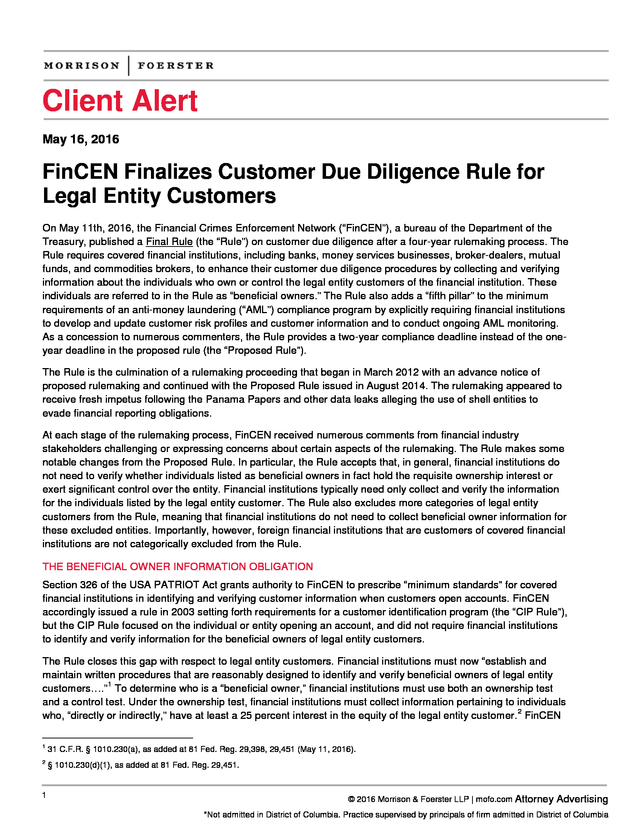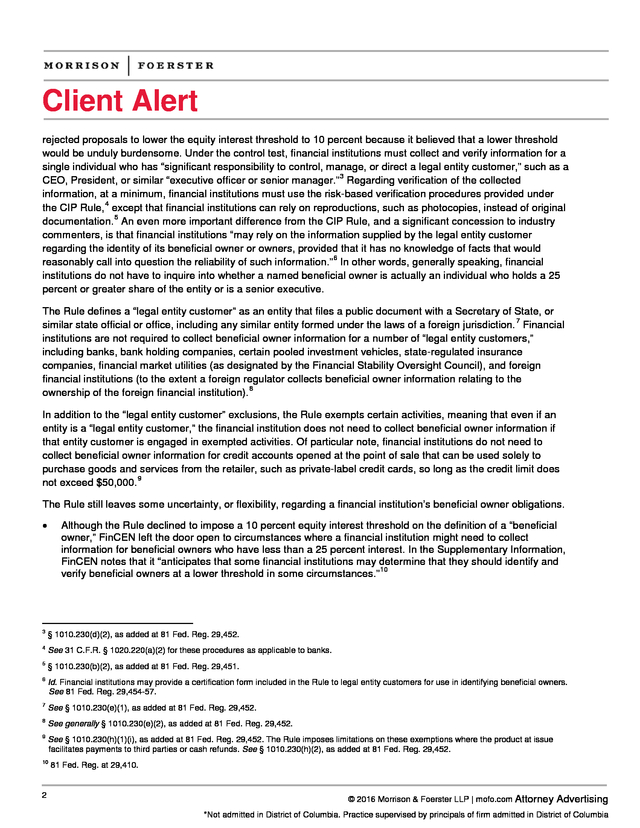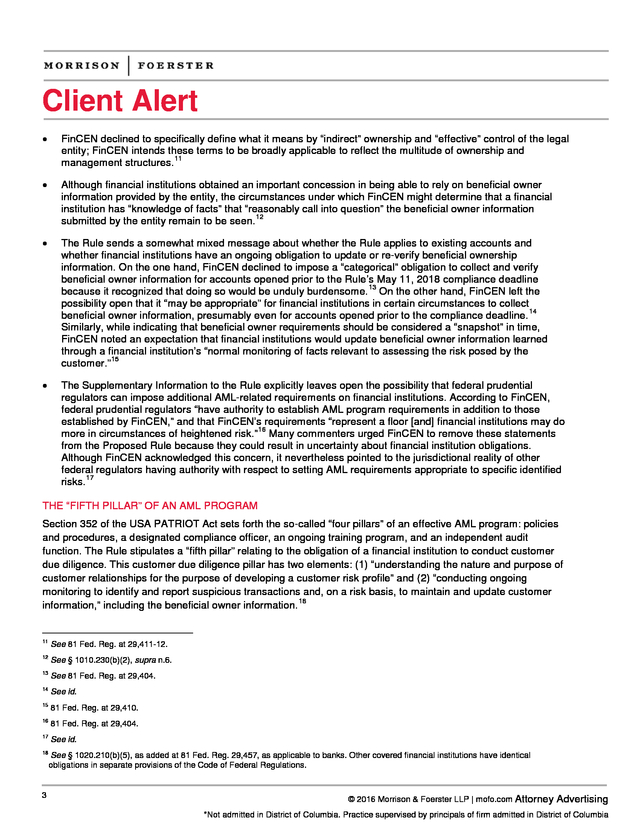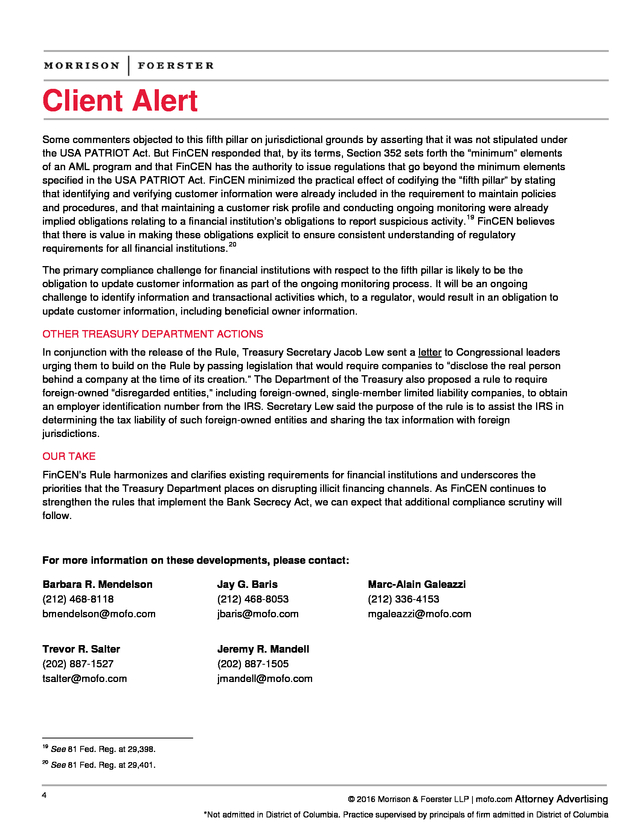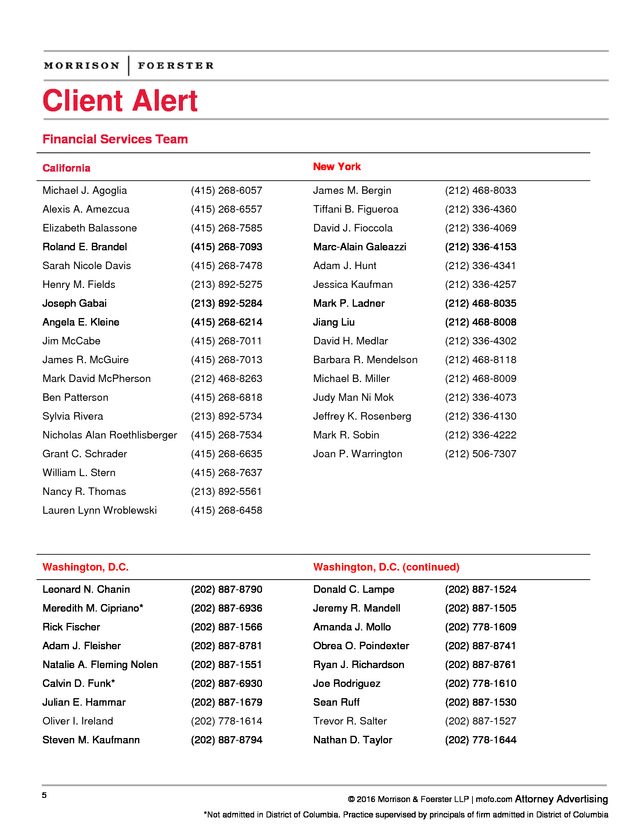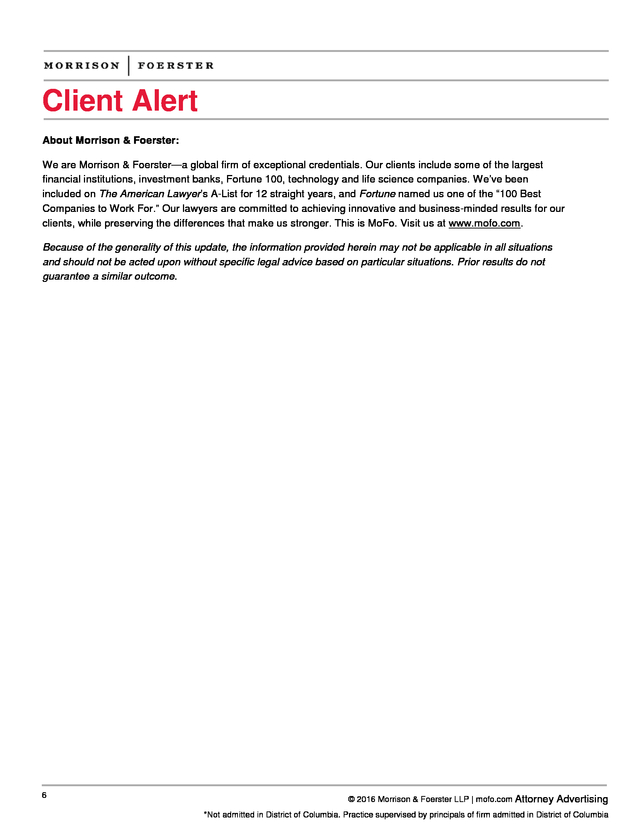FinCEN Finalizes Customer Due Diligence Rule for Legal Entity Customers – May 16, 2016
Morrison & Foerster
Description
Client Alert
May 16, 2016
FinCEN Finalizes Customer Due Diligence Rule for
Legal Entity Customers
On May 11th, 2016, the Financial Crimes Enforcement Network (“FinCEN”), a bureau of the Department of the
Treasury, published a Final Rule (the “Rule”) on customer due diligence after a four-year rulemaking process. The
Rule requires covered financial institutions, including banks, money services businesses, broker-dealers, mutual
funds, and commodities brokers, to enhance their customer due diligence procedures by collecting and verifying
information about the individuals who own or control the legal entity customers of the financial institution. These
individuals are referred to in the Rule as “beneficial owners.” The Rule also adds a “fifth pillar” to the minimum
requirements of an anti-money laundering (“AML”) compliance program by explicitly requiring financial institutions
to develop and update customer risk profiles and customer information and to conduct ongoing AML monitoring.
As a concession to numerous commenters, the Rule provides a two-year compliance deadline instead of the oneyear deadline in the proposed rule (the “Proposed Rule”).
The Rule is the culmination of a rulemaking proceeding that began in March 2012 with an advance notice of
proposed rulemaking and continued with the Proposed Rule issued in August 2014. The rulemaking appeared to
receive fresh impetus following the Panama Papers and other data leaks alleging the use of shell entities to
evade financial reporting obligations.
At each stage of the rulemaking process, FinCEN received numerous comments from financial industry
stakeholders challenging or expressing concerns about certain aspects of the rulemaking.
The Rule makes some notable changes from the Proposed Rule. In particular, the Rule accepts that, in general, financial institutions do not need to verify whether individuals listed as beneficial owners in fact hold the requisite ownership interest or exert significant control over the entity. Financial institutions typically need only collect and verify the information for the individuals listed by the legal entity customer.
The Rule also excludes more categories of legal entity customers from the Rule, meaning that financial institutions do not need to collect beneficial owner information for these excluded entities. Importantly, however, foreign financial institutions that are customers of covered financial institutions are not categorically excluded from the Rule. THE BENEFICIAL OWNER INFORMATION OBLIGATION Section 326 of the USA PATRIOT Act grants authority to FinCEN to prescribe “minimum standards” for covered financial institutions in identifying and verifying customer information when customers open accounts. FinCEN accordingly issued a rule in 2003 setting forth requirements for a customer identification program (the “CIP Rule”), but the CIP Rule focused on the individual or entity opening an account, and did not require financial institutions to identify and verify information for the beneficial owners of legal entity customers. The Rule closes this gap with respect to legal entity customers.
Financial institutions must now “establish and maintain written procedures that are reasonably designed to identify and verify beneficial owners of legal entity 1 customers….” To determine who is a “beneficial owner,” financial institutions must use both an ownership test and a control test. Under the ownership test, financial institutions must collect information pertaining to individuals 2 who, “directly or indirectly,” have at least a 25 percent interest in the equity of the legal entity customer. FinCEN 1 31 C.F.R.
§ 1010.230(a), as added at 81 Fed. Reg. 29,398, 29,451 (May 11, 2016). 2 § 1010.230(d)(1), as added at 81 Fed.
Reg. 29,451. 1 © 2016 Morrison & Foerster LLP | mofo.com Attorney Advertising *Not admitted in District of Columbia. Practice supervised by principals of firm admitted in District of Columbia .
Client Alert rejected proposals to lower the equity interest threshold to 10 percent because it believed that a lower threshold would be unduly burdensome. Under the control test, financial institutions must collect and verify information for a single individual who has “significant responsibility to control, manage, or direct a legal entity customer,” such as a 3 CEO, President, or similar “executive officer or senior manager.” Regarding verification of the collected information, at a minimum, financial institutions must use the risk-based verification procedures provided under 4 the CIP Rule, except that financial institutions can rely on reproductions, such as photocopies, instead of original 5 documentation. An even more important difference from the CIP Rule, and a significant concession to industry commenters, is that financial institutions “may rely on the information supplied by the legal entity customer regarding the identity of its beneficial owner or owners, provided that it has no knowledge of facts that would 6 reasonably call into question the reliability of such information.” In other words, generally speaking, financial institutions do not have to inquire into whether a named beneficial owner is actually an individual who holds a 25 percent or greater share of the entity or is a senior executive. The Rule defines a “legal entity customer” as an entity that files a public document with a Secretary of State, or 7 similar state official or office, including any similar entity formed under the laws of a foreign jurisdiction. Financial institutions are not required to collect beneficial owner information for a number of “legal entity customers,” including banks, bank holding companies, certain pooled investment vehicles, state-regulated insurance companies, financial market utilities (as designated by the Financial Stability Oversight Council), and foreign financial institutions (to the extent a foreign regulator collects beneficial owner information relating to the 8 ownership of the foreign financial institution). In addition to the “legal entity customer” exclusions, the Rule exempts certain activities, meaning that even if an entity is a “legal entity customer,” the financial institution does not need to collect beneficial owner information if that entity customer is engaged in exempted activities.
Of particular note, financial institutions do not need to collect beneficial owner information for credit accounts opened at the point of sale that can be used solely to purchase goods and services from the retailer, such as private-label credit cards, so long as the credit limit does 9 not exceed $50,000. The Rule still leaves some uncertainty, or flexibility, regarding a financial institution’s beneficial owner obligations. • Although the Rule declined to impose a 10 percent equity interest threshold on the definition of a “beneficial owner,” FinCEN left the door open to circumstances where a financial institution might need to collect information for beneficial owners who have less than a 25 percent interest. In the Supplementary Information, FinCEN notes that it “anticipates that some financial institutions may determine that they should identify and 10 verify beneficial owners at a lower threshold in some circumstances.” 3 § 1010.230(d)(2), as added at 81 Fed. Reg.
29,452. 4 See 31 C.F.R. § 1020.220(a)(2) for these procedures as applicable to banks. 5 § 1010.230(b)(2), as added at 81 Fed. Reg.
29,451. 6 Id. Financial institutions may provide a certification form included in the Rule to legal entity customers for use in identifying beneficial owners. See 81 Fed. Reg.
29,454-57. 7 See § 1010.230(e)(1), as added at 81 Fed. Reg. 29,452. 8 See generally § 1010.230(e)(2), as added at 81 Fed.
Reg. 29,452. 9 See § 1010.230(h)(1)(i), as added at 81 Fed. Reg.
29,452. The Rule imposes limitations on these exemptions where the product at issue facilitates payments to third parties or cash refunds. See § 1010.230(h)(2), as added at 81 Fed.
Reg. 29,452. 10 2 81 Fed. Reg.
at 29,410. © 2016 Morrison & Foerster LLP | mofo.com Attorney Advertising *Not admitted in District of Columbia. Practice supervised by principals of firm admitted in District of Columbia . Client Alert • FinCEN declined to specifically define what it means by “indirect” ownership and “effective” control of the legal entity; FinCEN intends these terms to be broadly applicable to reflect the multitude of ownership and 11 management structures. • Although financial institutions obtained an important concession in being able to rely on beneficial owner information provided by the entity, the circumstances under which FinCEN might determine that a financial institution has “knowledge of facts” that “reasonably call into question” the beneficial owner information 12 submitted by the entity remain to be seen. • The Rule sends a somewhat mixed message about whether the Rule applies to existing accounts and whether financial institutions have an ongoing obligation to update or re-verify beneficial ownership information. On the one hand, FinCEN declined to impose a “categorical” obligation to collect and verify beneficial owner information for accounts opened prior to the Rule’s May 11, 2018 compliance deadline 13 because it recognized that doing so would be unduly burdensome. On the other hand, FinCEN left the possibility open that it “may be appropriate” for financial institutions in certain circumstances to collect 14 beneficial owner information, presumably even for accounts opened prior to the compliance deadline. Similarly, while indicating that beneficial owner requirements should be considered a “snapshot” in time, FinCEN noted an expectation that financial institutions would update beneficial owner information learned through a financial institution’s “normal monitoring of facts relevant to assessing the risk posed by the 15 customer.” • The Supplementary Information to the Rule explicitly leaves open the possibility that federal prudential regulators can impose additional AML-related requirements on financial institutions. According to FinCEN, federal prudential regulators “have authority to establish AML program requirements in addition to those established by FinCEN,” and that FinCEN’s requirements “represent a floor [and] financial institutions may do 16 more in circumstances of heightened risk.” Many commenters urged FinCEN to remove these statements from the Proposed Rule because they could result in uncertainty about financial institution obligations. Although FinCEN acknowledged this concern, it nevertheless pointed to the jurisdictional reality of other federal regulators having authority with respect to setting AML requirements appropriate to specific identified 17 risks. THE “FIFTH PILLAR” OF AN AML PROGRAM Section 352 of the USA PATRIOT Act sets forth the so-called “four pillars” of an effective AML program: policies and procedures, a designated compliance officer, an ongoing training program, and an independent audit function.
The Rule stipulates a “fifth pillar” relating to the obligation of a financial institution to conduct customer due diligence. This customer due diligence pillar has two elements: (1) “understanding the nature and purpose of customer relationships for the purpose of developing a customer risk profile” and (2) “conducting ongoing monitoring to identify and report suspicious transactions and, on a risk basis, to maintain and update customer 18 information,” including the beneficial owner information. 11 See 81 Fed. Reg.
at 29,411-12. 12 See § 1010.230(b)(2), supra n.6. 13 See 81 Fed. Reg. at 29,404. 14 See id. 15 81 Fed.
Reg. at 29,410. 16 81 Fed. Reg.
at 29,404. 17 See id. 18 3 See § 1020.210(b)(5), as added at 81 Fed. Reg. 29,457, as applicable to banks.
Other covered financial institutions have identical obligations in separate provisions of the Code of Federal Regulations. © 2016 Morrison & Foerster LLP | mofo.com Attorney Advertising *Not admitted in District of Columbia. Practice supervised by principals of firm admitted in District of Columbia . Client Alert Some commenters objected to this fifth pillar on jurisdictional grounds by asserting that it was not stipulated under the USA PATRIOT Act. But FinCEN responded that, by its terms, Section 352 sets forth the “minimum” elements of an AML program and that FinCEN has the authority to issue regulations that go beyond the minimum elements specified in the USA PATRIOT Act. FinCEN minimized the practical effect of codifying the “fifth pillar” by stating that identifying and verifying customer information were already included in the requirement to maintain policies and procedures, and that maintaining a customer risk profile and conducting ongoing monitoring were already 19 implied obligations relating to a financial institution’s obligations to report suspicious activity. FinCEN believes that there is value in making these obligations explicit to ensure consistent understanding of regulatory 20 requirements for all financial institutions. The primary compliance challenge for financial institutions with respect to the fifth pillar is likely to be the obligation to update customer information as part of the ongoing monitoring process.
It will be an ongoing challenge to identify information and transactional activities which, to a regulator, would result in an obligation to update customer information, including beneficial owner information. OTHER TREASURY DEPARTMENT ACTIONS In conjunction with the release of the Rule, Treasury Secretary Jacob Lew sent a letter to Congressional leaders urging them to build on the Rule by passing legislation that would require companies to “disclose the real person behind a company at the time of its creation.” The Department of the Treasury also proposed a rule to require foreign-owned “disregarded entities,” including foreign-owned, single-member limited liability companies, to obtain an employer identification number from the IRS. Secretary Lew said the purpose of the rule is to assist the IRS in determining the tax liability of such foreign-owned entities and sharing the tax information with foreign jurisdictions. OUR TAKE FinCEN’s Rule harmonizes and clarifies existing requirements for financial institutions and underscores the priorities that the Treasury Department places on disrupting illicit financing channels. As FinCEN continues to strengthen the rules that implement the Bank Secrecy Act, we can expect that additional compliance scrutiny will follow. For more information on these developments, please contact: Barbara R.
Mendelson (212) 468-8118 bmendelson@mofo.com Jay G. Baris (212) 468-8053 jbaris@mofo.com Trevor R. Salter (202) 887-1527 tsalter@mofo.com Jeremy R.
Mandell (202) 887-1505 jmandell@mofo.com 19 See 81 Fed. Reg. at 29,398. 20 Marc-Alain Galeazzi (212) 336-4153 mgaleazzi@mofo.com See 81 Fed.
Reg. at 29,401. 4 © 2016 Morrison & Foerster LLP | mofo.com Attorney Advertising *Not admitted in District of Columbia. Practice supervised by principals of firm admitted in District of Columbia .
Client Alert Financial Services Team New York California Michael J. Agoglia (415) 268-6057 James M. Bergin (212) 468-8033 Alexis A. Amezcua (415) 268-6557 Tiffani B.
Figueroa (212) 336-4360 Elizabeth Balassone (415) 268-7585 David J. Fioccola (212) 336-4069 Roland E. Brandel (415) 268-7093 Marc-Alain Galeazzi (212) 336-4153 Sarah Nicole Davis (415) 268-7478 Adam J.
Hunt (212) 336-4341 Henry M. Fields (213) 892-5275 Jessica Kaufman (212) 336-4257 Joseph Gabai (213) 892-5284 Mark P. Ladner (212) 468-8035 Angela E.
Kleine (415) 268-6214 Jiang Liu (212) 468-8008 Jim McCabe (415) 268-7011 David H. Medlar (212) 336-4302 James R. McGuire (415) 268-7013 Barbara R.
Mendelson (212) 468-8118 Mark David McPherson (212) 468-8263 Michael B. Miller (212) 468-8009 Ben Patterson (415) 268-6818 Judy Man Ni Mok (212) 336-4073 Sylvia Rivera (213) 892-5734 Jeffrey K. Rosenberg (212) 336-4130 Nicholas Alan Roethlisberger (415) 268-7534 Mark R.
Sobin (212) 336-4222 Grant C. Schrader (415) 268-6635 Joan P. Warrington (212) 506-7307 William L.
Stern (415) 268-7637 Nancy R. Thomas (213) 892-5561 Lauren Lynn Wroblewski (415) 268-6458 Washington, D.C. Washington, D.C. (continued) Leonard N.
Chanin (202) 887-8790 Donald C. Lampe (202) 887-1524 Meredith M. Cipriano* (202) 887-6936 Jeremy R.
Mandell (202) 887-1505 Rick Fischer (202) 887-1566 Amanda J. Mollo (202) 778-1609 Adam J. Fleisher (202) 887-8781 Obrea O.
Poindexter (202) 887-8741 Natalie A. Fleming Nolen (202) 887-1551 Ryan J. Richardson (202) 887-8761 Calvin D.
Funk* (202) 887-6930 Joe Rodriguez (202) 778-1610 Julian E. Hammar (202) 887-1679 Sean Ruff (202) 887-1530 Oliver I. Ireland (202) 778-1614 Trevor R.
Salter (202) 887-1527 Steven M. Kaufmann (202) 887-8794 Nathan D. Taylor (202) 778-1644 5 © 2016 Morrison & Foerster LLP | mofo.com Attorney Advertising *Not admitted in District of Columbia.
Practice supervised by principals of firm admitted in District of Columbia . Client Alert About Morrison & Foerster: We are Morrison & Foerster—a global firm of exceptional credentials. Our clients include some of the largest financial institutions, investment banks, Fortune 100, technology and life science companies. We’ve been included on The American Lawyer’s A-List for 12 straight years, and Fortune named us one of the “100 Best Companies to Work For.” Our lawyers are committed to achieving innovative and business-minded results for our clients, while preserving the differences that make us stronger. This is MoFo.
Visit us at www.mofo.com. Because of the generality of this update, the information provided herein may not be applicable in all situations and should not be acted upon without specific legal advice based on particular situations. Prior results do not guarantee a similar outcome. 6 © 2016 Morrison & Foerster LLP | mofo.com Attorney Advertising *Not admitted in District of Columbia. Practice supervised by principals of firm admitted in District of Columbia .
The Rule makes some notable changes from the Proposed Rule. In particular, the Rule accepts that, in general, financial institutions do not need to verify whether individuals listed as beneficial owners in fact hold the requisite ownership interest or exert significant control over the entity. Financial institutions typically need only collect and verify the information for the individuals listed by the legal entity customer.
The Rule also excludes more categories of legal entity customers from the Rule, meaning that financial institutions do not need to collect beneficial owner information for these excluded entities. Importantly, however, foreign financial institutions that are customers of covered financial institutions are not categorically excluded from the Rule. THE BENEFICIAL OWNER INFORMATION OBLIGATION Section 326 of the USA PATRIOT Act grants authority to FinCEN to prescribe “minimum standards” for covered financial institutions in identifying and verifying customer information when customers open accounts. FinCEN accordingly issued a rule in 2003 setting forth requirements for a customer identification program (the “CIP Rule”), but the CIP Rule focused on the individual or entity opening an account, and did not require financial institutions to identify and verify information for the beneficial owners of legal entity customers. The Rule closes this gap with respect to legal entity customers.
Financial institutions must now “establish and maintain written procedures that are reasonably designed to identify and verify beneficial owners of legal entity 1 customers….” To determine who is a “beneficial owner,” financial institutions must use both an ownership test and a control test. Under the ownership test, financial institutions must collect information pertaining to individuals 2 who, “directly or indirectly,” have at least a 25 percent interest in the equity of the legal entity customer. FinCEN 1 31 C.F.R.
§ 1010.230(a), as added at 81 Fed. Reg. 29,398, 29,451 (May 11, 2016). 2 § 1010.230(d)(1), as added at 81 Fed.
Reg. 29,451. 1 © 2016 Morrison & Foerster LLP | mofo.com Attorney Advertising *Not admitted in District of Columbia. Practice supervised by principals of firm admitted in District of Columbia .
Client Alert rejected proposals to lower the equity interest threshold to 10 percent because it believed that a lower threshold would be unduly burdensome. Under the control test, financial institutions must collect and verify information for a single individual who has “significant responsibility to control, manage, or direct a legal entity customer,” such as a 3 CEO, President, or similar “executive officer or senior manager.” Regarding verification of the collected information, at a minimum, financial institutions must use the risk-based verification procedures provided under 4 the CIP Rule, except that financial institutions can rely on reproductions, such as photocopies, instead of original 5 documentation. An even more important difference from the CIP Rule, and a significant concession to industry commenters, is that financial institutions “may rely on the information supplied by the legal entity customer regarding the identity of its beneficial owner or owners, provided that it has no knowledge of facts that would 6 reasonably call into question the reliability of such information.” In other words, generally speaking, financial institutions do not have to inquire into whether a named beneficial owner is actually an individual who holds a 25 percent or greater share of the entity or is a senior executive. The Rule defines a “legal entity customer” as an entity that files a public document with a Secretary of State, or 7 similar state official or office, including any similar entity formed under the laws of a foreign jurisdiction. Financial institutions are not required to collect beneficial owner information for a number of “legal entity customers,” including banks, bank holding companies, certain pooled investment vehicles, state-regulated insurance companies, financial market utilities (as designated by the Financial Stability Oversight Council), and foreign financial institutions (to the extent a foreign regulator collects beneficial owner information relating to the 8 ownership of the foreign financial institution). In addition to the “legal entity customer” exclusions, the Rule exempts certain activities, meaning that even if an entity is a “legal entity customer,” the financial institution does not need to collect beneficial owner information if that entity customer is engaged in exempted activities.
Of particular note, financial institutions do not need to collect beneficial owner information for credit accounts opened at the point of sale that can be used solely to purchase goods and services from the retailer, such as private-label credit cards, so long as the credit limit does 9 not exceed $50,000. The Rule still leaves some uncertainty, or flexibility, regarding a financial institution’s beneficial owner obligations. • Although the Rule declined to impose a 10 percent equity interest threshold on the definition of a “beneficial owner,” FinCEN left the door open to circumstances where a financial institution might need to collect information for beneficial owners who have less than a 25 percent interest. In the Supplementary Information, FinCEN notes that it “anticipates that some financial institutions may determine that they should identify and 10 verify beneficial owners at a lower threshold in some circumstances.” 3 § 1010.230(d)(2), as added at 81 Fed. Reg.
29,452. 4 See 31 C.F.R. § 1020.220(a)(2) for these procedures as applicable to banks. 5 § 1010.230(b)(2), as added at 81 Fed. Reg.
29,451. 6 Id. Financial institutions may provide a certification form included in the Rule to legal entity customers for use in identifying beneficial owners. See 81 Fed. Reg.
29,454-57. 7 See § 1010.230(e)(1), as added at 81 Fed. Reg. 29,452. 8 See generally § 1010.230(e)(2), as added at 81 Fed.
Reg. 29,452. 9 See § 1010.230(h)(1)(i), as added at 81 Fed. Reg.
29,452. The Rule imposes limitations on these exemptions where the product at issue facilitates payments to third parties or cash refunds. See § 1010.230(h)(2), as added at 81 Fed.
Reg. 29,452. 10 2 81 Fed. Reg.
at 29,410. © 2016 Morrison & Foerster LLP | mofo.com Attorney Advertising *Not admitted in District of Columbia. Practice supervised by principals of firm admitted in District of Columbia . Client Alert • FinCEN declined to specifically define what it means by “indirect” ownership and “effective” control of the legal entity; FinCEN intends these terms to be broadly applicable to reflect the multitude of ownership and 11 management structures. • Although financial institutions obtained an important concession in being able to rely on beneficial owner information provided by the entity, the circumstances under which FinCEN might determine that a financial institution has “knowledge of facts” that “reasonably call into question” the beneficial owner information 12 submitted by the entity remain to be seen. • The Rule sends a somewhat mixed message about whether the Rule applies to existing accounts and whether financial institutions have an ongoing obligation to update or re-verify beneficial ownership information. On the one hand, FinCEN declined to impose a “categorical” obligation to collect and verify beneficial owner information for accounts opened prior to the Rule’s May 11, 2018 compliance deadline 13 because it recognized that doing so would be unduly burdensome. On the other hand, FinCEN left the possibility open that it “may be appropriate” for financial institutions in certain circumstances to collect 14 beneficial owner information, presumably even for accounts opened prior to the compliance deadline. Similarly, while indicating that beneficial owner requirements should be considered a “snapshot” in time, FinCEN noted an expectation that financial institutions would update beneficial owner information learned through a financial institution’s “normal monitoring of facts relevant to assessing the risk posed by the 15 customer.” • The Supplementary Information to the Rule explicitly leaves open the possibility that federal prudential regulators can impose additional AML-related requirements on financial institutions. According to FinCEN, federal prudential regulators “have authority to establish AML program requirements in addition to those established by FinCEN,” and that FinCEN’s requirements “represent a floor [and] financial institutions may do 16 more in circumstances of heightened risk.” Many commenters urged FinCEN to remove these statements from the Proposed Rule because they could result in uncertainty about financial institution obligations. Although FinCEN acknowledged this concern, it nevertheless pointed to the jurisdictional reality of other federal regulators having authority with respect to setting AML requirements appropriate to specific identified 17 risks. THE “FIFTH PILLAR” OF AN AML PROGRAM Section 352 of the USA PATRIOT Act sets forth the so-called “four pillars” of an effective AML program: policies and procedures, a designated compliance officer, an ongoing training program, and an independent audit function.
The Rule stipulates a “fifth pillar” relating to the obligation of a financial institution to conduct customer due diligence. This customer due diligence pillar has two elements: (1) “understanding the nature and purpose of customer relationships for the purpose of developing a customer risk profile” and (2) “conducting ongoing monitoring to identify and report suspicious transactions and, on a risk basis, to maintain and update customer 18 information,” including the beneficial owner information. 11 See 81 Fed. Reg.
at 29,411-12. 12 See § 1010.230(b)(2), supra n.6. 13 See 81 Fed. Reg. at 29,404. 14 See id. 15 81 Fed.
Reg. at 29,410. 16 81 Fed. Reg.
at 29,404. 17 See id. 18 3 See § 1020.210(b)(5), as added at 81 Fed. Reg. 29,457, as applicable to banks.
Other covered financial institutions have identical obligations in separate provisions of the Code of Federal Regulations. © 2016 Morrison & Foerster LLP | mofo.com Attorney Advertising *Not admitted in District of Columbia. Practice supervised by principals of firm admitted in District of Columbia . Client Alert Some commenters objected to this fifth pillar on jurisdictional grounds by asserting that it was not stipulated under the USA PATRIOT Act. But FinCEN responded that, by its terms, Section 352 sets forth the “minimum” elements of an AML program and that FinCEN has the authority to issue regulations that go beyond the minimum elements specified in the USA PATRIOT Act. FinCEN minimized the practical effect of codifying the “fifth pillar” by stating that identifying and verifying customer information were already included in the requirement to maintain policies and procedures, and that maintaining a customer risk profile and conducting ongoing monitoring were already 19 implied obligations relating to a financial institution’s obligations to report suspicious activity. FinCEN believes that there is value in making these obligations explicit to ensure consistent understanding of regulatory 20 requirements for all financial institutions. The primary compliance challenge for financial institutions with respect to the fifth pillar is likely to be the obligation to update customer information as part of the ongoing monitoring process.
It will be an ongoing challenge to identify information and transactional activities which, to a regulator, would result in an obligation to update customer information, including beneficial owner information. OTHER TREASURY DEPARTMENT ACTIONS In conjunction with the release of the Rule, Treasury Secretary Jacob Lew sent a letter to Congressional leaders urging them to build on the Rule by passing legislation that would require companies to “disclose the real person behind a company at the time of its creation.” The Department of the Treasury also proposed a rule to require foreign-owned “disregarded entities,” including foreign-owned, single-member limited liability companies, to obtain an employer identification number from the IRS. Secretary Lew said the purpose of the rule is to assist the IRS in determining the tax liability of such foreign-owned entities and sharing the tax information with foreign jurisdictions. OUR TAKE FinCEN’s Rule harmonizes and clarifies existing requirements for financial institutions and underscores the priorities that the Treasury Department places on disrupting illicit financing channels. As FinCEN continues to strengthen the rules that implement the Bank Secrecy Act, we can expect that additional compliance scrutiny will follow. For more information on these developments, please contact: Barbara R.
Mendelson (212) 468-8118 bmendelson@mofo.com Jay G. Baris (212) 468-8053 jbaris@mofo.com Trevor R. Salter (202) 887-1527 tsalter@mofo.com Jeremy R.
Mandell (202) 887-1505 jmandell@mofo.com 19 See 81 Fed. Reg. at 29,398. 20 Marc-Alain Galeazzi (212) 336-4153 mgaleazzi@mofo.com See 81 Fed.
Reg. at 29,401. 4 © 2016 Morrison & Foerster LLP | mofo.com Attorney Advertising *Not admitted in District of Columbia. Practice supervised by principals of firm admitted in District of Columbia .
Client Alert Financial Services Team New York California Michael J. Agoglia (415) 268-6057 James M. Bergin (212) 468-8033 Alexis A. Amezcua (415) 268-6557 Tiffani B.
Figueroa (212) 336-4360 Elizabeth Balassone (415) 268-7585 David J. Fioccola (212) 336-4069 Roland E. Brandel (415) 268-7093 Marc-Alain Galeazzi (212) 336-4153 Sarah Nicole Davis (415) 268-7478 Adam J.
Hunt (212) 336-4341 Henry M. Fields (213) 892-5275 Jessica Kaufman (212) 336-4257 Joseph Gabai (213) 892-5284 Mark P. Ladner (212) 468-8035 Angela E.
Kleine (415) 268-6214 Jiang Liu (212) 468-8008 Jim McCabe (415) 268-7011 David H. Medlar (212) 336-4302 James R. McGuire (415) 268-7013 Barbara R.
Mendelson (212) 468-8118 Mark David McPherson (212) 468-8263 Michael B. Miller (212) 468-8009 Ben Patterson (415) 268-6818 Judy Man Ni Mok (212) 336-4073 Sylvia Rivera (213) 892-5734 Jeffrey K. Rosenberg (212) 336-4130 Nicholas Alan Roethlisberger (415) 268-7534 Mark R.
Sobin (212) 336-4222 Grant C. Schrader (415) 268-6635 Joan P. Warrington (212) 506-7307 William L.
Stern (415) 268-7637 Nancy R. Thomas (213) 892-5561 Lauren Lynn Wroblewski (415) 268-6458 Washington, D.C. Washington, D.C. (continued) Leonard N.
Chanin (202) 887-8790 Donald C. Lampe (202) 887-1524 Meredith M. Cipriano* (202) 887-6936 Jeremy R.
Mandell (202) 887-1505 Rick Fischer (202) 887-1566 Amanda J. Mollo (202) 778-1609 Adam J. Fleisher (202) 887-8781 Obrea O.
Poindexter (202) 887-8741 Natalie A. Fleming Nolen (202) 887-1551 Ryan J. Richardson (202) 887-8761 Calvin D.
Funk* (202) 887-6930 Joe Rodriguez (202) 778-1610 Julian E. Hammar (202) 887-1679 Sean Ruff (202) 887-1530 Oliver I. Ireland (202) 778-1614 Trevor R.
Salter (202) 887-1527 Steven M. Kaufmann (202) 887-8794 Nathan D. Taylor (202) 778-1644 5 © 2016 Morrison & Foerster LLP | mofo.com Attorney Advertising *Not admitted in District of Columbia.
Practice supervised by principals of firm admitted in District of Columbia . Client Alert About Morrison & Foerster: We are Morrison & Foerster—a global firm of exceptional credentials. Our clients include some of the largest financial institutions, investment banks, Fortune 100, technology and life science companies. We’ve been included on The American Lawyer’s A-List for 12 straight years, and Fortune named us one of the “100 Best Companies to Work For.” Our lawyers are committed to achieving innovative and business-minded results for our clients, while preserving the differences that make us stronger. This is MoFo.
Visit us at www.mofo.com. Because of the generality of this update, the information provided herein may not be applicable in all situations and should not be acted upon without specific legal advice based on particular situations. Prior results do not guarantee a similar outcome. 6 © 2016 Morrison & Foerster LLP | mofo.com Attorney Advertising *Not admitted in District of Columbia. Practice supervised by principals of firm admitted in District of Columbia .



